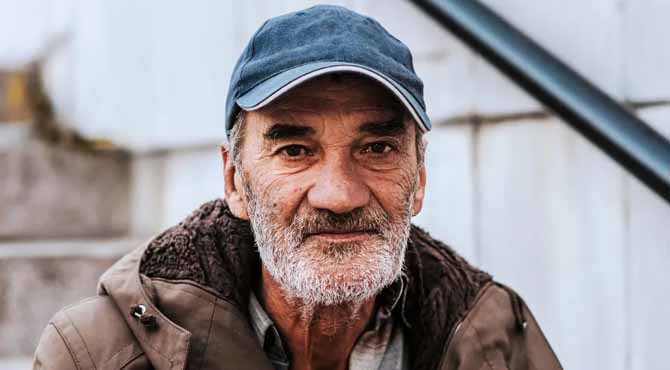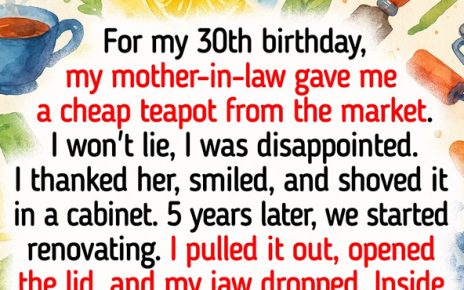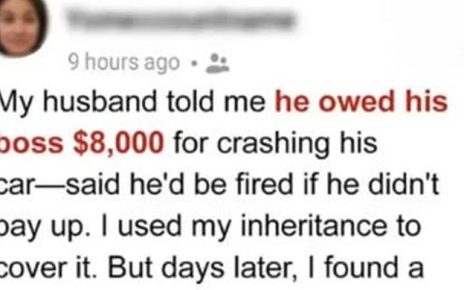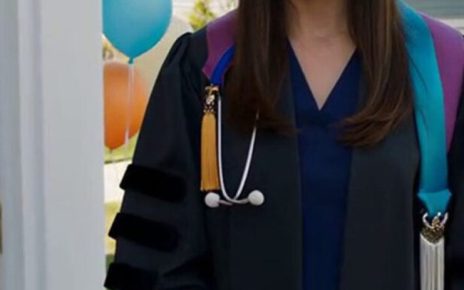My name is Sarah. I’m a 36-year-old mother of four young children, and I still can’t believe the way a single moment in the dairy aisle changed our entire lives. Let me tell you the story of how my act of kindness helped me escape poverty.
I used to be so happy with my late husband, Daniel, who was everything to me. He worked as a mechanic. His work entailed long hours at the shop and grease under his fingernails. But he always came home with a soft smile and enough love to fill the walls of our home.
While he went out daily to earn a living for us, I stayed home with our kids. I was responsible for raising our children, keeping the house in order, preparing and cooking meals, and tackling laundry piles taller than I was.
I also gladly attended our children’s soccer practices, helped with homework, and tucked them into bed. It wasn’t fancy, but it was beautiful. We had our comfortable roles: he was the provider; I was a homemaker.
That all changed when cancer came for him.
It came fast. The kind of fast that doesn’t let you catch your breath before you’re drowning in it. We fought hard. The chemo bills were relentless, draining every dollar we had, including our savings, his strength, and my hope.
When the money was gone, we tried selling some of his tools and even our wedding rings. But in the end, he still slipped through my fingers.
I was left alone, crushed by grief and a mountain of medical bills.
I remember standing at his funeral thinking, “How do I do this alone?”
But I couldn’t allow myself to crumble just then; I had four kids who needed me. So I sold the place where we had built so many memories, our home. I moved us into a small rental across town.
But that was only the beginning of the major changes that lay ahead.
I didn’t have a degree or any fancy skill set to fall back on, and worse yet, I had no time to study for one. I knew I needed to care for the children and pay off the immense debt left, so I took the first steady job I could find.
Luck led me to a job cleaning and stocking at the local grocery store. I mean, it was nothing glamorous, but it was something I could learn to do quickly, especially with the years of experience I had doing it for my family.
The job allowed me to pay the bills, and it was honest work.
It gave me enough to keep food on the table and the lights on. Every day, I swept and scrubbed and restocked with one thought in my mind that pushed me forward: my kids depend on me, and I can’t fall apart. Not now.
But something happened at work that would quietly shift the course of our lives.
It was a Tuesday morning when I saw him.
I was pushing my mop down the dairy aisle when I spotted an old man staring at the milk like it held the secrets of the universe. His coat was patched and threadbare, his shoes nearly falling apart, and in his basket was a small loaf of bread and a can of beans.
He looked so tired, and his hands trembled when he reached for a carton, then pulled back.
Something about him tugged at my heartstrings.
So, I leaned my mop against the shelf and walked up to him. “Sir, are you okay?” I asked gently.
He flinched like he hadn’t expected anyone to notice him, then offered a faint smile. “Oh, honey, I’m fine, just deciding,” he said, voice raspy but polite.
When I didn’t walk away, he continued, “I just haven’t eaten in a few days, and I’m wondering if I can afford anything else.”
My heart sank.
That served as the icebreaker we needed, and we started talking.
Something had shifted. Maybe he saw the sincerity in my face, cause he started telling me about his life.
I learned his name was Thomas. He was quiet, humble, and when I cracked a joke about how milk prices seemed to go up every week, he chuckled.
He revealed that a few years ago, he had a wife, with whom he’d built a stable life. But then he lost her after a long illness.
Before she died, he tried everything to allow her to keep getting the expensive and long treatments she needed.
The poor man started working odd jobs before selling off furniture, but the expenses kept piling up.
“I couldn’t just let her suffer,” he said softly, his voice breaking. “So I resorted to selling more things little by little. First it was my car, then the jewelry she no longer wore, and even the house. I thought if I could just buy her time, maybe a miracle would happen… maybe God would meet me halfway,” he said, his eyes fixed on the floor.
“At one point, I even sold the tools I’d owned for over 30 years. But still, it wasn’t enough to save her. The miracle never happened, despite all the sacrifices. And time ran out.”
After his wife died, all he had was the crippling debt. To repay some of it, he sold the last of the things he had in storage after moving to stay with a friend when his house went on the market.
After his friend couldn’t accommodate him anymore, he found himself drifting to the outskirts of town. There, he built a small makeshift shelter with his own hands by piecing together tarps, plywood, and anything he could salvage.
It wasn’t much, but it was a roof of sorts, and it managed to keep him dry on rainy nights.
He wasn’t angry or bitter. Just… tired and worn down in a way that loneliness can.
“I don’t need much,” he said softly, almost to himself. “Some days, I get by on just bread; other days, I have nothing. I drink water and pretend it’s enough.”
My heart clenched.
“People don’t see my story; they only see an old man in shabby clothes, and quickly walk away,” he said quietly, eyes still on the row of milk. “I can live without comfort, without new things… but hunger breaks you in a way nothing else does.”
Hearing this, my chest tightened. I realized he wasn’t asking for pity; he was simply explaining how he got there. And the way he spoke, with quiet resignation, made me realize how invisible he must have felt.
I couldn’t walk away.
So I asked, “What would you want right now, if you could have anything? Maybe, something warm?”
He hesitated as if he wasn’t used to people asking that kind of thing. “Anything would really be a blessing,” he said.
I only had a few dollars left until payday next week. I’d already planned our meals down to the can, but something in me knew I had to help him.
Without thinking about it further, I grabbed a cart and filled it.
I added canned soup, sandwich meat, fruit, soap, toothpaste, socks to keep his feet warm in those worn-out shoes, and a full gallon of milk. I added some snacks, too. Everyone deserves snacks, right?
I wanted him to have not just one meal, but enough to carry him through the next few days.
At the checkout, he kept trying to stop me.
“You don’t need to do this. I’m sure you have a family of your own,” he said, voice shaking.
“I know, and I do,” I told him, “but you need to eat. Please. Just let me do this.”
When I handed him the bags, his eyes welled up. He squeezed my hand and said something I’ll never forget:
“You’ve given me more than food. You’ve reminded me I’m still human.”
I knew money was scarce, but at that moment, my heart was full! It was full in a way that reminded me goodness still mattered, even in the hardest times.
That was the first and last time I saw Thomas.
Life moved on, the bills kept piling up, my kids grew taller, and I continued pushing my mop and stacking shelves.
Then, about five months after my encounter with Thomas, there was a knock at our door on a breezy fall afternoon.
I wiped my hands on my jeans, expecting a neighbor, but instead found a man in a charcoal suit with a leather briefcase on my porch. His shoes were polished, and he held a dusty cardboard box carefully in both hands.
“Are you Sarah?” he asked.
“Yes?” I replied cautiously.
“I am Attorney Green. I represent a late client who has died and left this package for you.”
I stared at the cardboard box he held, confused. “There must be some mistake. I don’t know any attorneys.”
“There is no mistake,” he said. “His name was Thomas. You might remember meeting him at the local grocery store?”
My heart stopped.
Mr. Greene handed me the box with surprising gentleness, gave a respectful nod, and turned to leave without another word.
I stood there holding it, stunned.
The box was surprisingly heavy. Its tape was cracked and yellowing, as though the box had been sealed and forgotten for years. My kids were gathered around the kitchen table, eyes wide with curiosity.
“Mom, what is it?” my oldest, Lily, asked.
“I… I’m not sure,” I said.
I peeled the tape back and opened the flaps. Right on top was a card with my name and last name written across the front in neat but shaky handwriting.
I began to read aloud.
Dear Sarah,
You may not remember me, but I will never forget you. Months ago, you bought food for an old man in a torn coat in the dairy aisle. What you didn’t know was that I wasn’t truly in need. My name is Thomas, but I have more than enough, including homes, investments, and land. The ragged clothes and empty basket were part of a disguise.
I gasped in shock before continuing.
The story about my wife was partially true; she did die from an illness. I was recently diagnosed with a rare disease and given months to live. I didn’t have children or any worthy relatives to leave my money to. So I created the character of a homeless man to help me find the right person to inherit what I’d leave behind.
I wanted to know if kindness still existed in a world that often looks away, especially when there is nothing to gain. Most people turned their backs. You didn’t. You gave freely, even when you had so little yourself. That moment taught me more about humanity than all my years of wealth ever did.
If you’re reading this, it means I have passed. Enclosed are documents that transfer my estate to you and your children. Use it well. May it bring you the security and peace you deserve.
With deepest gratitude, Thomas
I lowered the letter slowly, the card trembling in my hands. I didn’t speak for a long time. The box held stacks of documents: property deeds, investment accounts, and trusts, everything now bearing my name.
My oldest tugged my sleeve. “Mom, what is it? What does it say?”
I laughed through my tears. “It says we’re going to be okay.”
Mr. Greene called me later that day to confirm the letter’s contents and to invite me to sign official documents at his office. He also explained how Thomas found me.
The next day after I met him, I was off. What I didn’t know was that while I was cleaning our tiny kitchen, the old man had gone back to the store looking for me.
He’d asked around.
I wore a name tag, so he had my first name, and one of the stock boys remembered me saying my last name when I’d clocked out a few days before. Thomas wrote it down on his phone.
Apparently, he hired a private investigator, and it took weeks, but eventually, the man found our address.
For years, I had walked a tightrope, terrified of one unexpected bill. I never imagined a stranger would reach across time and loss to give my children a future.
I gave him food. He gave us hope.
I hugged my children that night and told them, “Never overlook someone just because they’re quiet or worn down. You never know who they really are or how deeply they’re watching the world.”
Thomas believed in kindness.
And now, so do I.




